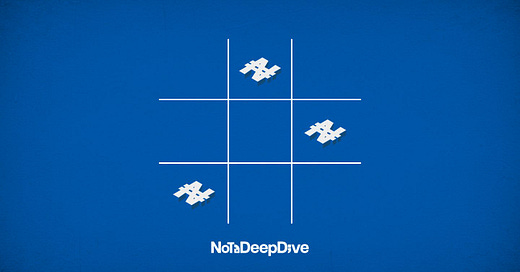I bet you know this feeling: you make a budget before payday and swear you’ll stick to it (never mind that you’ve made the same promise every month this year). Then one Friday, you decide to hang out with friends.
“No going overboard,” you tell yourself in the mirror before heading out.
Fast-forward to the morning after. Several debit alerts. A sinking feeling in your stomach. Who can blame you? Everyone was having a great time, and budgets don’t count when the vibes are right.
But now, you have more month than money so out comes your calculator. You’ve got two choices:
Tighten your belt and hang on to your financial fingertips until the end of the month.
Start searching for loan apps and let their interest rates remind you to stick to your budget next time
Before you think you’ve stumbled onto a personal finance newsletter, this is the same-ish dilemma some startups that raised money at sky-high valuations in 2020 and 2021 now find themselves in because The VCs were drunk and are now tightening their belts.
The fintech Dash raised $32.8 million in a seed round with one publication claiming it was valued at $200 million.
A few years ago, these lofty valuations didn’t seem like a problem. Who was going to argue when every VC in town wanted to write a check? But now, those startups need more money, and investors aren’t buying the old numbers. If your growth numbers are not sexy enough for investors, you have three options:
Make drastic cuts to extend runway. We’re already seeing this play out across multiple startups.
Raise money at the same valuation through secondary sales. Less exciting but preserves optics (see Stripe, Kuda).
Raise money at a lower valuation (a down round). Painful and bad for employee morale, but it keeps the company alive.
Here’s a TechCrunch article from this week:
“Plaid, which connects bank accounts to financial applications, has sold about $575 million worth of common stock at a $6.1 billion post-money valuation…”
“The valuation is about less than half of the $13.4 billion that San Francisco-based Plaid was valued at when it raised a $425 million Series D in April 2021 in a round led by Altimeter Capital.”
A spokesperson acknowledged the decrease, saying it was “simply a reflection of the contraction of multiples across the market.”
In late 2024 (the raise was announced in 2025), a Nigerian HR startup also raised money at a significant down round. Such are the realities of this market.
Early-stage startups that raised at high valuations a few years ago now need to show serious traction if they hope to raise money. Two weeks ago, Vendease laid off several employees and slashed salaries hoping to convince investors it could move toward profitability.
Earnipay followed the same path this week. Here’s an excerpt from one article:
“Earnipay, the Nigerian fintech best known for its earned wage access (EWA) product, has laid off a portion of its team in a move founder and CEO Nonso Onwuzulike describes as “difficult but necessary.” He cited the company’s high burn rate and a shift in focus toward its most profitable segment—business lending—as the primary reasons for the decision. The layoffs come just over two years after Earnipay raised a $4 million seed round.”
It’s telling when early-stage startups are talking about profitability. A few years ago, the mantra was grow at all costs. Now, investors are scrutinizing burn rates like never before.
For unprofitable unicorns, the situation is even tougher. Investors aren’t eager to fund them at their 2020-2022 lofty valuations, and the public markets aren’t feeling generous either.
In early 2022, Flutterwave raised $250 million in a series D round that saw its valuation soar to $3 billion. It defied the phenomenon of global VCs routinely assigning lower valuations to African startups compared to their counterparts in developed markets a.k.a the African discount.
Despite market corrections since 2022 (and one 2023 report showing a $1.6bn valuation in a secondary transaction), Flutterwave is still on par with comparable global unicorns like Mercury ($3.5B), Global Blue ($2.5B), and Paysafe ($1.24B).
Will another funding round (which it is ripe for) see a change in its valuation? That remains to be seen.
But one thing to note is that unlike many of its peers, Flutterwave does not seem keen on tapping VCs for another round. It has spent the past two years talking about (or around?) an Initial Public Offering (IPO).
This year, every time the company is asked about an IPO (it gets asked a lot!), it responds by telling you about its goal of reaching profitability.
My hot take? Investors may have structured agreements that limit further private raises, nudging Flutterwave toward an IPO.
Here is this week’s installment of “Will Flutterwave go public or not” from Semafor:
“Flutterwave, Africa’s most valuable unicorn, won’t rule out the possibility of selling to a larger player, its CEO told Semafor, but stressed that the fintech player is laser focused on reaching profitability this year.
The company has discussed the potential of an initial public offering over the last few years. But with a valuation of more than 3 billion dollars, after raising around 500 million dollars since its 2016 launch, Olugbenga ‘GB’ Agboola said Flutterwave was open to the possibility of being acquired by a larger player.”
Will you find a lot of companies that can afford Flutterwave at that valuation? Never say never. But if I had to wager, an IPO seems more likely. However, profitability is crucial to not getting decimated in a public market that may not understand its business too well.
Another Nigerian unicorn that flirted with an IPO (it even hired JPMorgan Chase and Citi Bank as advisors) for years before seemingly abandoning the idea is Interswitch. Interswitch may have been able to ditch an IPO because it has always been profitable, opening up its options.
In 2011, a group of investors led by Helios acquired a 75% stake in Interswitch.
A top Nigerian bank that invested N30 million in 2002 sold its stake for N4.3 billion.
In 2019, Visa bought a 20% stake in Interswitch for $200 million, showing that a well-run, profitable company can attract strategic investors
In 2023, despite brutal naira devaluation, Interswitch still reported $3.5 million in profits.
Without profitability, it’s doubtful Flutterwave will make the big splash it wants in the public market. So there it is: the people’s butterfly won’t take flight without proving it can make money first.
See you on Sunday!






